Find free Virginia divorce records on any resident throughout the state.
Divorce records are vital legal documents that mark the annulment of marriages; these documents are very information for legal and personal purposes. Records of divorce have been systematically filed since 1918. They have substantial details about why the couple divorced and how they divided their marital property.
Additionally, these documents offer detailed information concerning the physical and legal custody of any children and outline the financial obligations of both parents. In Virginia, many divorce records are accessible at no cost, allowing people to view or retrieve them at any time.
Who Can View Divorce Records in Virginia?
The Virginia Public Records Act § 42.1-76 and Virginia Freedom of Information Act (FOIA) § 2.2-3700 guarantee citizens a right to obtain important information held by the state.1, 2 Nevertheless, these records can be edited to remove sensitive details or they may even be sealed because of censored information.
In addition, it should be noted that the public is entitled to access only the relevant information related to a certain divorce record. Such records are normally restricted for use by a particular set of individuals such as the current spouse, adult children, parents or guardians, grandparents, adult siblings, or legal representatives acting on behalf of the registrant or their family.
For those hoping to look back on their family histories or carry out genealogical research, these records can be viewed 25 years after the divorce was finalized, in accordance with Virginian law.
These records are held in two primary locations: at the Circuit Court Clerk’s Office, where the divorce was commenced, and at the Vital Records Office. However, the less detailed divorce records are kept in the Circuit Court Clerk’s office, upon which they get transferred to the Vitals Records center to be stored.
Looking at the data, the divorce rate in Virginia is 8.23%, with no legal recognition for common law marriage. While the national average length of a marriage in the US is approximately 19.9 years, couples in Maine and West Virginia tend to have more lasting unions.
How To Look Up Virginia Divorce Records
Fortunately, record seekers can access divorce records via an online portal. They should visit the website for the Virginia Judicial System. The site has a free public divorce records search tool that individuals can use to look up specific case records.3
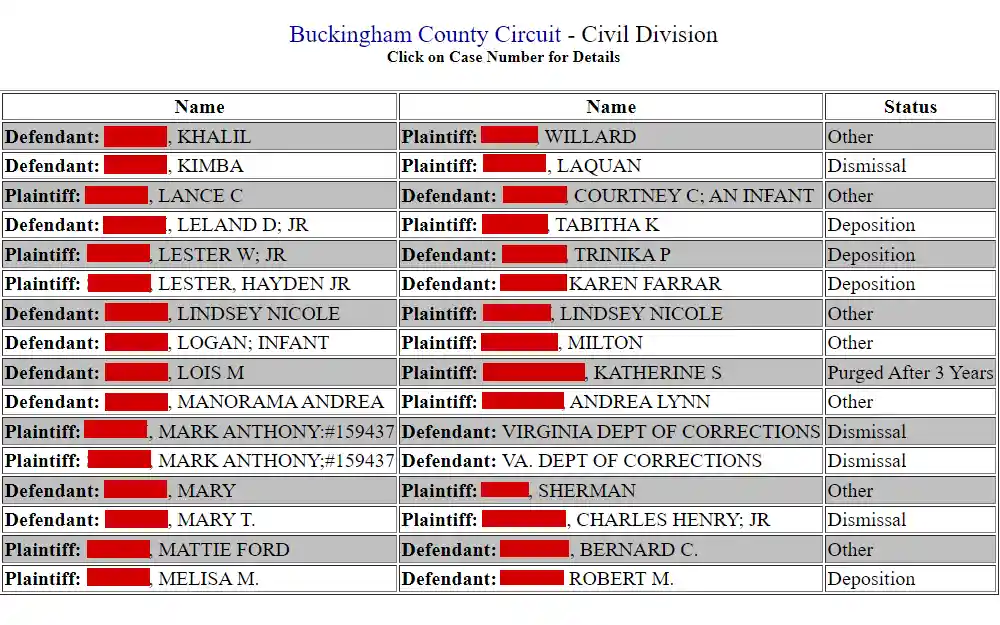
First, it will have searchers choose the right county where the divorce occurred and then direct them to an online tool. Individuals will then input some basic information about the case, like one party’s name, the court hearing date, or case number to search a desired record.
Another route to look up divorce records is via the Virginia Department of Health, Division of Vital Records. The department is the primary source for looking up these records. They also provide these vital records online for easy access.
Citizens are required to enter information regarding the type of record they are searching for, along with their personal information, proof of identity and their address.
After filling out the Commonwealth of Virginia Application Form to access divorce records, requesters will be required to pay a fee, which is $12 per record search. The fee is only payable by credit card, money order or a check directed towards the State Health Department. This fee is not refundable in case the record is not found.
For mail-in requests, individuals will need to start with completing the application form provided by the Vital Records Office.
Requesters are required to fill in the details on this form carefully; this will include their personal information as well as specifics about which record is needed.
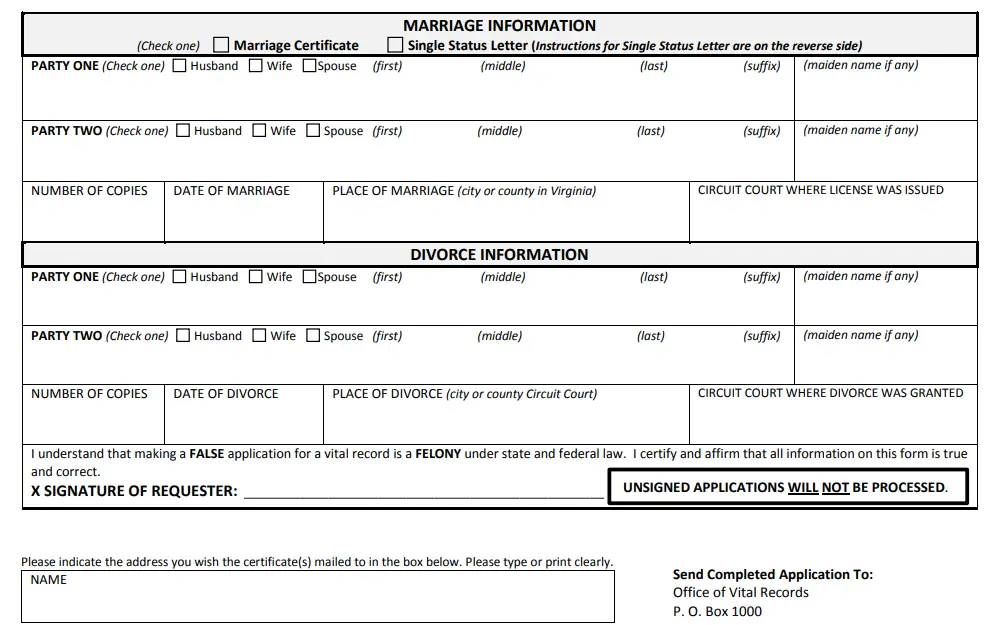
A copy of any identity proof should be attached to this form. For each document search, it costs $12 (non-refundable). The amount is required to be paid through check or money order and is only directly payable to the State Health Department.
The form — along with the check or money order — must be sent to the following location:
Office of Vital Records
P. O. Box 1000
Richmond, VA 23218-1000
Obtaining divorce records can also be done through a walk-in visit to the Vital Records Office. Interested individuals will be required to visit the office — from Monday through Friday, 7:00 am till 4:30 pm at the below address — to submit the Commonwealth of Virginia application for certification of a marriage or divorce record at the front desk:
Office of Vital Records:
2001 Maywill Street
Richmond, Virginia 23230
The application should have the applicant’s signature and a clear photocopy of an ID. For each copy requested, there is a fee of $12 payable by check, money order, payment card or cash payable to the State Health Department. However, after 2:00 pm any request will be processed on the next business day.
It usually takes around 8 weeks for the records department to search up their inventory. Once the requested records are ready, individuals will be informed over the phone to collect the records.
If the records are required urgently, then the Virginia Health Department offers expedited delivery with help from VitalChek Network. An extra service charge applies.
Searching Counties & Cities Throughout VA for Divorce Records
The Division of Vital Records, under the Virginia Department of Health, is the major authority that maintains divorce records.6
Although the cross-state search is wide, individuals who are interested in narrowing down their search can access divorce records at the county level, as every county in Virginia may have its independent repository, three of which are discussed below.
The Fairfax County Office of Vital Records can provide certified copies of divorce records of any dissolution that took place in the county. The office offers the required documents dating back to 1918 up until now.
However, only couples involved in the divorce process or their immediate family members can access these papers. Legal guardians need custody proof for acquiring the records.
The cost of obtaining the records is around $12 – the same as that of obtaining Virginia divorce records. This can be paid through cash, money order, check or through credit cards. To obtain these records, individuals must download the Virginia Health Department’s (VHD) divorce form and fill it out fully.
To acquire the divorce records, the following information is required:
- Maiden name of the bride
- Name of the groom
- Place of marriage
- Exact date (day, month, and year) of marriage
- Name of the circuit court where the divorce was finalized
Once individuals have completed the form, then they must take this form — along with a proof of identity and payment — to the Fairfax County Office of Vital Records, at one of the following addresses:
Herndon-Reston District Office
1850 Cameron Glen Drive, Suite 100
Reston, Virginia, 20190-3310
Annandale District (DO) Office
7611 Little River Turnpike
Annandale, Virginia – 22003
Joseph Willard Health Center
3750 Blenheim Boulevard
Fairfax, Virginia – 22030
Hyland S. County Government Center (Mt. Vernon District Office)
8350 – Richmond Highway, Suite 233
Alexandria, Virginia – 22309
All of the offices are operational from Monday – Friday, 8 a.m. – 4 p.m. The records office can also be reached through phone at 703-246-7100 for more information.
Note: The records can only be obtained through a walk-in service and cannot be obtained via phone or online methods.
For those opting another route through Clerk of Circuit Court should send a request letter directed towards Fairfax Circuit court.7
The letter, along with a self-addressed stamped envelope, should be accompanied by either a certified check or money order worth $3 payable to the Clerk of the Court and sent to the following address:
Fairfax Circuit Court
File Room Copy Center
4110 Chain Bridge Road, Suite 320
Fairfax, Virginia – 22030
Searchers can refer to the tutorial on accessing all Fairfax County divorce information for further insight and helpful guidance.
In Prince William County divorce records are kept at the Clerk of the Circuit Court’s office. To access them, individuals will need to visit Room 305, Public Service Center. This place houses the Clerk’s Office, which possesses all vital documents.
Requesters will need to bring with them a filled-out Court Case Copy Request form.
Every official procedure requires certain fees and obtaining copies of court records is no different. Individuals will be required to pay 50 cents per page for copies of these court records. However, to obtain certified copies, you will need to pay an additional $2 per document.
When opting for postal requests instead of direct visits, you will need to send the following along with the request form:
- Check or money order covering copy fee directly payable to Prince William County Circuit Court Clerk.
- A self-addressed envelope bearing adequate postage.
Mail in requests should go directly to the Clerk’s Office at the following address:
Prince William County Circuit Court Clerk’s Office
Room 314
9311 Lee Avenue
Manassas, Virginia (VA) – 20110
Loudoun County offers numerous ways to access Virginia divorce records, one of which is through Loudoun County’s online request center.8 This system lets you track all your requests and see older ones as well.
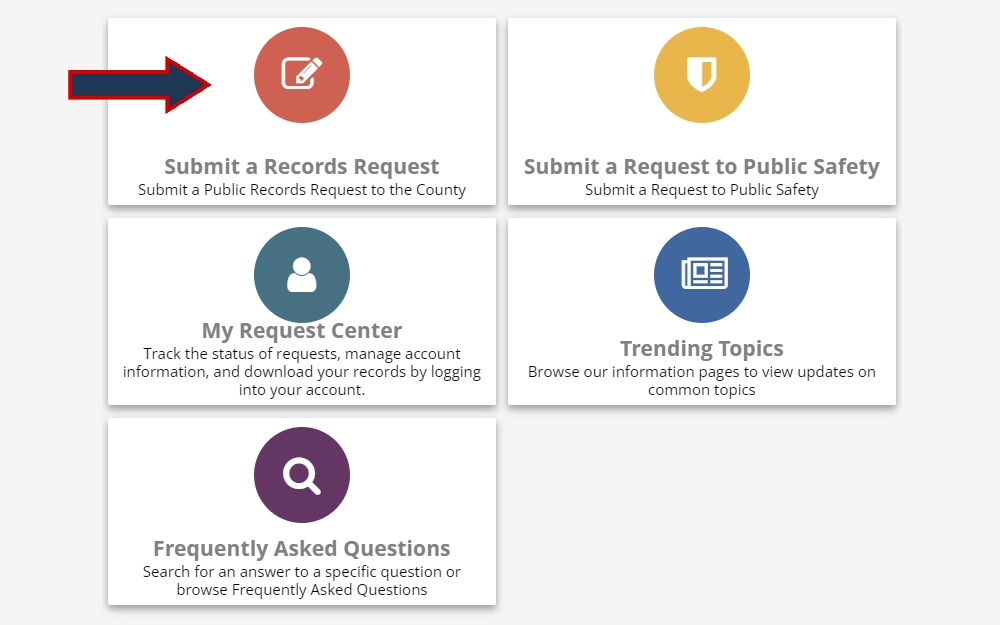
First, you will have to sign up for an account; then login and submit your record request.
Another method of obtaining these records is by sending a direct email address to [email protected]. The email must detail what records are required along with the applicant’s personal contact information.
To request records by mail, interested individuals are required to send their written request to:
Office of the County Administrator/FOIA Officer
PO Box 7000
1 Harrison Street, South East,
Leesburg, Virginia (VA) 20175-7000
For those who prefer communicating in person, visits can also be made directly to the Clerk’s Office at the courthouse at the following address:
Clerk of Circuit Court
18 East Market Street
Leesburg, Virginia (VA) – 20176
For obtaining divorce records at the city level, individuals will have to contact their respective Circuit Court Clerks and provide them with the relevant information for accessing these records. For those living in Virginia Beach the Circuit Court Clerk’s Office can be reached at the following address to inquire about divorce records:
Virginia Beach Circuit Court Clerk
2425 Nimmo Parkway
Virginia Beach, Virginia (VA) – 23456
In Chesapeake City, one of the easiest ways to obtain public records, including divorce certificates and records, is through their online FOIA Portal.9 Apart from this, direct requests for accessing divorce records under the Freedom of Information Act can also be made through the following:10
Phone: 757.382.6166
Email: [email protected]
Mail requests may also be made at the following address:
Office of the City Manager
306 Cedar Road
Chesapeake, VA – 23322
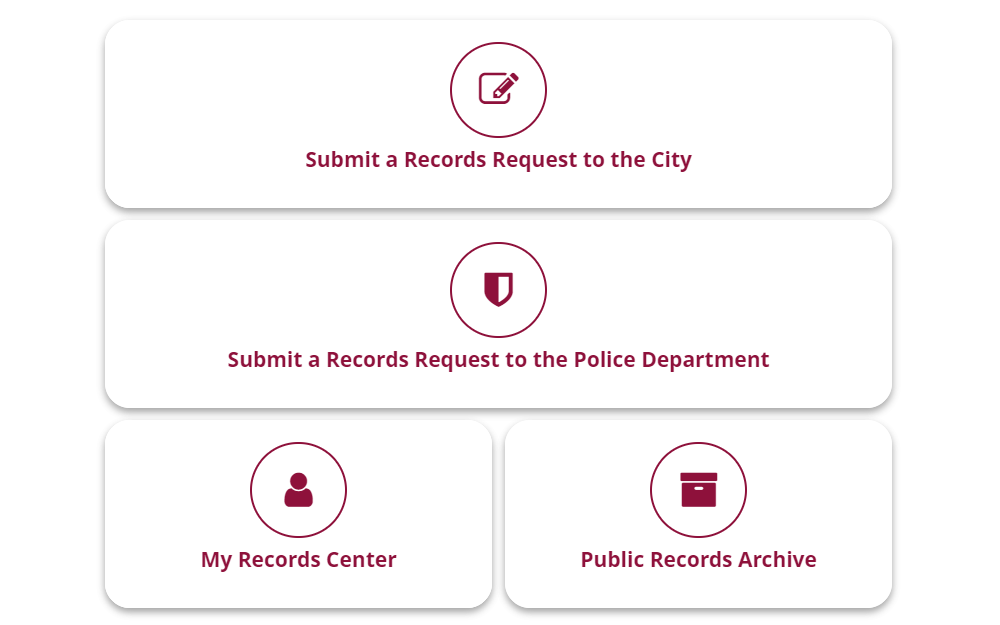
On another note, if you’re seeking records within Arlington City; then making a record search request to the Circuit Court Clerk office is also possible as mandated under FOIA, dictated by VA Code § 2.2-3704.11 The code also specifies that the Court Clerk is bound to respond to a FOIA request with an adequate fee for duplicating, accessing and supplying records.
Virginia is a state that takes pride in its rich history, which explains why older marriage records can also be found for genealogical research.
It is not uncommon for the state to keep archival indices that contain old marital records. You can go back in time by exploring clues in places such as the Virginia State Archives to add depth to your research.
Researching Family Genealogy & Lineage via the Virginia Divorce Archives (Free)
The Library of Virginia, resting in the heart of Richmond, carries the rich legacy of the Commonwealth. It served as a central hub for all historical documents relating to government and was also formerly known as the Virginia State Library and Archives.
The library was formed back in 1823 by the Virginia General Assembly and is one of the most important places to look for official records dating back to early colonial times.
This institution isn’t just a library; it also functions as a caring host for over 800 thousand bound volumes, nearly 700 thousand public documents and more than 410 thousand microforms that include microfilmed newspapers. Plus, the library also hosts a collection of around 309 thousand photographs along with loads of other pictorial materials.
The archive also has a staggering collection of manuscript items and records exceeding the hundred million mark – containing everything related to the history of Virginia, be it governance, tradition or culture!
To find historical divorce records, the Library of Virginia has an online portal in partnership with approved third parties. This service is made particularly for residents of Virginia.
Through the online portal, members of the public can access Virginia divorce records dating from 1918 through 2014. Also, any record filed prior to 1853 can be found in County Records or the Legislative Petition collection.12
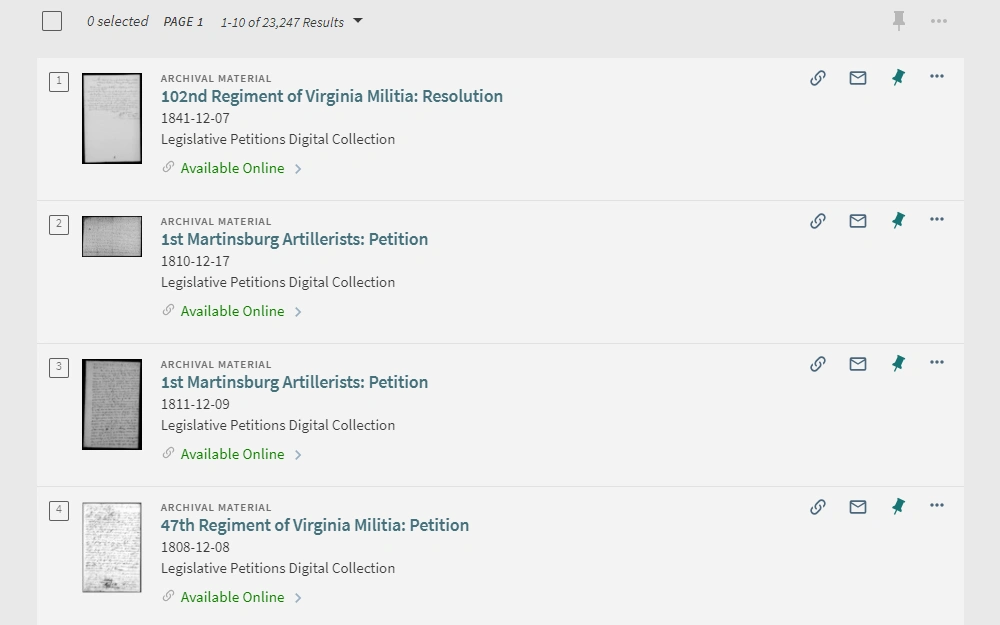
The library also maintains the Lost Records Localities Collection, previously known as the Burned Record Counties Collection. Here, individuals will find photocopies of lost court transcripts, which include divorce records, that survived either within unrelated county archives or came up during processing projects.
Previously known as the Burned Record Counties Collection, these documents have been carefully organized and entered into databases for easy access and retrieval.14
However, post-1853 divorce records aren’t held by the Library of Virginia and are kept with the Office of Vital Records.
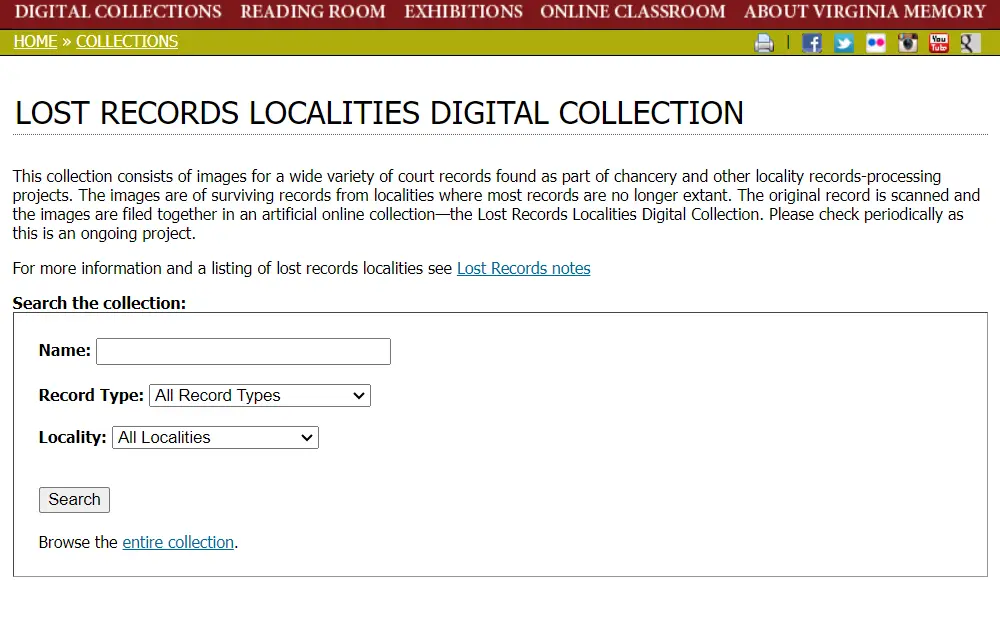
To obtain certified copies of known files, applications and a set fee are required by the Office of Vital Records. This fee is $12 per copy – considered as both file search fee and record provision cost even if no record comes forth.
To retrieve the records, individuals need to fill out an application for certified records form containing complete names along with event dates and places. Tracing one’s lineage or conducting thorough historical research can only be done after 25 years for marriage, death and divorce records, while birth records can only be obtained after 100 years, as guided by Section 32.1-271, Code of Virginia.15
In addition to the divorce records, individuals can expand their search by exploring other historical resources, including old newspapers. Divorce was a common announcement found in many historical newspapers.
Family divorce knowledge can also be obtained from analyzing the local and regional newspapers. Marriage and divorce cases are usually highlighted in religious registers. Interested individuals can navigate different churches to find out if their parents and grandparents attended these, or look in other places of worship.
Local historical societies may also keep information relating to marriage and divorce. Navigating such societies in search of family history can greatly assist in an individual’s genealogical research.
How To Review Dissolution of Marriage & Divorce Records in Virginia
The records become official documents when a separation occurs, consisting primarily of three forms – divorce decree, records and certificate. Each form holds its purpose but is collectively recorded by the specific Circuit Court controlling that particular case.
In Virginia, terms dissolution of marriage and divorce are used interchangeably and there is no difference between the two.
To find out if someone is divorced in Virginia, individuals will have to wait 25 years till the records become public. The records can then be acquired through either the Office of Vital Records or through one of the County Clerk of Courts listed on the government website, where the divorce was finalized.
The Virginia Department of Health, Division of Vital Records Office maintains all of the divorce records across the state. The Office of Vital Records maintains an online portal that could be used to access divorce records.
However, these records could also be obtained through Mail, or in person visit to the office (as discussed above). Requesters will have to fill out an application form for a marriage/divorce record and pay the required fees – $12.00 per certificate search.
Alternatively, record seekers may write to the Circuit Court Clerk’s Office of the County where the divorce was filed. The office maintains a divorce index for such cases. The request letter should detail all of the information required to get the records, like personal information, name of the parties involved, case number, etc., along with a pay order or check payable to the Court Clerk’s Office.
In Virginia, any type of informal marriage is not recognized, including common law unions. Common law marriages are informal domestic partnerships without the formalities of a marriage license or ceremony that were outlawed in 1877.
In fact, such living arrangements even led to legal troubles under Statute 18.2-345 of the Code of Virginia, which was finally repealed in 2013.16
Nevertheless, common law marriages remain unrecognized within the state. For situations involving common law divorces, couples cannot legally seek a severance because they were not recognized as being together by law, therefore, their records cannot be obtained.
Other types of informal marriages such as civil unions and domestic partnerships are also not recognized in Virginia either.
How To Initiate a Divorce & Answer Divorce Petitions in Virginia
Initiating and addressing divorce petitions can be viewed from two perspectives: those of the plaintiff and the defendant, in a proceeding. In Virginia, the grounds for a divorce fall under two categories, at-fault and no-fault.17 If the separated couple lives apart for a specified duration, no-fault divorce is an option.
After getting a divorce, couples are officially declared as ex-husband and wife.
Grounds of at-fault include adultery, cruelty, desertion, etc. Filing for a divorce in Virginia is not free; it differs between jurisdictions, with there being a need to pay both court fees and attorneys.18 However, a petition can be filed for obtaining a divorce in a no-fault case without incurring any costs.
Depending on multiple factors, the period may stretch for more than six months but may sometimes be shorter in no-fault divorces.
Child support and alimony are important decisions that are to be decided by the courts whenever a divorce occurs. Virginia has strict guidelines on child support, whereas alimony is decided taking into account financial inequalities as well as the length of the marriage.
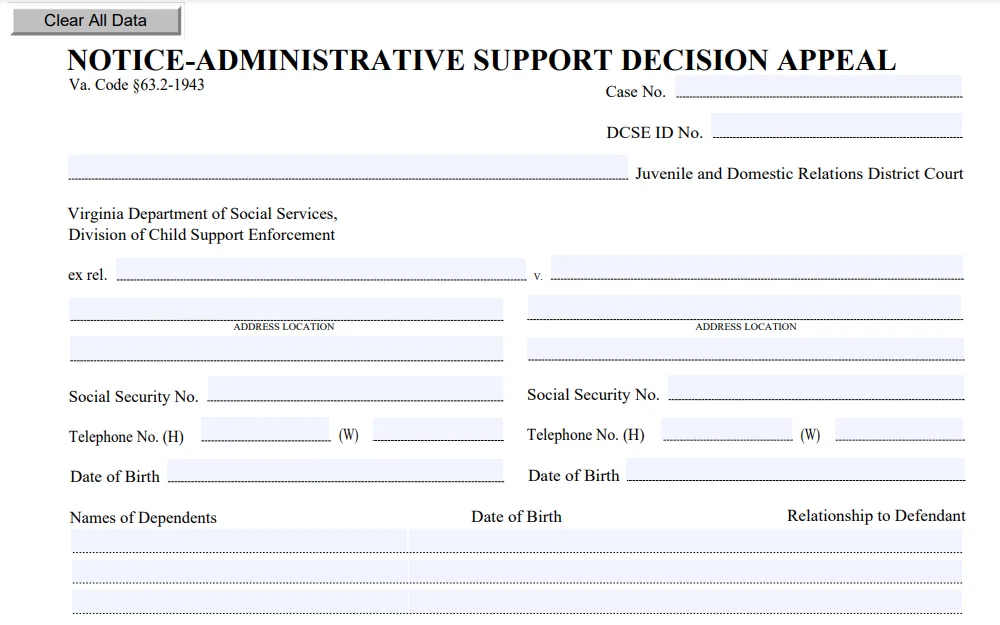
In relation to division of property, Virginia adopts the equitable distribution principle which is fair as opposed to a plain 50/50 distribution share. In this case, assets would undergo a divorce appraisal so as to be valued equally.
It is, therefore, important to know the petition when you are at the end of the divorce paper. Make sure that you understand what a divorce petition says if it is served for you.
Look for an attorney with experience in this matter, then respond to the divorce petition within a period of 21 days.
Non-compliance can amount to an uncontested divorce through a default judgment.
A person should consult with a lawyer or an attorney who can manage these delicate matters on divorce. Such concerns include child custody, spousal support, and shareholding among others. In these situations, mediation can be preferred over litigation but each situation varies.
Besides divorce, Virginia provides the options of annulment and legal separations (mensa et thoro).20 In a legal separation, the court approves agreements on child support, property division, and custody while in an annulment, a marriage is declared invalid.
Navigating the complexities of divorce in Virginia requires a deep understanding of the legal landscape. For expert guidance and to access valuable resources, including Virginia divorce records, it is advisable to consult with an experienced family law attorney and review the steps in this resource.
Anybody interested in tracking down additional information on residents throughout the state can utilize the steps for obtaining Virginia marital records or conduct a free Virginia public record search to check details of warrants, crimes, inmates, court documents, property taxes, and more.
References
1Commonwealth of Virginia. (n.d.). Virginia Public Records Act. LIS Virginia Law. Retrieved November 13, 2023, from <https://law.lis.virginia.gov/vacodepopularnames/virginia-public-records-act/>
2Commonwealth of Virginia. (n.d.). Virginia Freedom of Information Act. LIS Virginia Law. Retrieved November 13, 2023, from <https://law.lis.virginia.gov/vacodepopularnames/virginia-freedom-of-information-act/>
3Office of the Executive Secretary, Supreme Court of Virginia. (n.d.). Virginia Courts Case Information. Retrieved November 13, 2023, from <https://eapps.courts.state.va.us/CJISWeb/MainMenu.do>
4Office of the Executive Secretary, Supreme Court of Virginia. (n.d.). Virginia Courts Case Information – Buckingham County Circuit – Civil Division. Retrieved November 13, 2023, from <https://eapps.courts.state.va.us/CJISWeb/Search.do>
5Virginia Department of Health. (2020, February). Commonwealth Of Virginia Application For Certification Of A Marriage And/Or Divorce Record. Retrieved November 13, 2023, from <https://www.vdh.virginia.gov/content/uploads/sites/93/2020/07/VS6MD_MarriageDivorce-application.pdf>
6Virginia Department of Health. (n.d.). Vital Records: Birth, Marriage, Divorce, and Death Certificates – Blue Ridge. Retrieved November 13, 2023, from <https://www.vdh.virginia.gov/blue-ridge/vital-records-birth-marriage-divorce-and-death-certificates/>
7Fairfax County. (2017, February). Fairfax Circuit Court. Retrieved November 13, 2023, from <https://www.fairfaxcounty.gov/circuit/sites/circuit/files/assets/documents/pdf/request-a-certified-copy-of-final-decree.pdf>
8Loudoun County, Virginia. (n.d.). Public Records Request Center. Retrieved November 13, 2023, from <https://loudouncountyva.govqa.us/WEBAPP/_rs/(S(teju4irfbqpltxfgeox42zzt))/supporthome.aspx>
9Chesapeake, Virginia. (n.d.). Public Records Center. Retrieved November 13, 2023, from <https://chesapeakeva.govqa.us/WEBAPP/_rs/(S(fxicv25roirk4cmzbuahv1k1))/SupportHome.aspx>
10Chesapeake, Virginia. (n.d.). FOIA: Virginia Freedom of Information Act. Retrieved November 13, 2023, from <https://www.cityofchesapeake.net/206/FOIA-Virginia-Freedom-of-Information-Act#makeRequest>
11Commonwealth of Virginia. (n.d.). Code of Virginia (2023 Updates). LIS Virginia Law. Retrieved November 13, 2023, from <https://law.lis.virginia.gov/vacodeupdates/title2.2/section2.2-3704/#:~:text=of%20Information%20Act-,%C2%A7%202.2%2D3704.,(2023%20updated%20section)>
12Library of Virginia. (2023, September 26). Home – Legislative Petitions – Research Guides & Indexes at The Library of Virginia. Retrieved November 13, 2023, from <https://lva-virginia.libguides.com/petitions>
13Library of Virginia. (n.d.). Library of Virginia Catalog. Retrieved November 13, 2023, from <https://lva.primo.exlibrisgroup.com/discovery/search?vid=01LVA_INST:01LVA&sortby=title&tab=LibraryCatalog&mfacet=lds04,include,legpt,1,lk&query=any,contains,divorce>
14Library of Virginia. (n.d.). Lost Records Localities Digital Collection. Virginia Memory. Retrieved November 13, 2023, from <https://www.virginiamemory.com/collections/lost>
15Commonwealth of Virginia. (n.d.). § 32.1-271. Disclosure of information in records; when unlawful; when permitted; proceeding to compel disclosure; when certain records made public. LIS Virginia Law. Retrieved November 13, 2023, from <https://law.lis.virginia.gov/vacode/title32.1/chapter7/section32.1-271/#:~:text=The%20State%20Registrar%20or%20the,need%2C%20as%20prescribed%20by%20Board>
16Virginia Division of Legislative Automated Systems, Commonwealth of Virginia. (n.d.). Bill Tracking – 2013 session > Legislation. Virginia LIS. Retrieved November 13, 2023, from <https://lis.virginia.gov/cgi-bin/legp604.exe?131+ful+SB969>
17Commonwealth of Virginia. (n.d.). § 20-91. Grounds for divorce from bond of matrimony; contents of decree. LIS Virginia Law. Retrieved November 13, 2023, from <https://law.lis.virginia.gov/vacode/title20/chapter6/section20-91/>
18Virginia Judicial System Court Self-Help. (2021, December 3). Divorce. Retrieved November 13, 2023, from <http://selfhelp.vacourts.gov/vacourts-self-help-divorce>
19Office of the Executive Secretary, Supreme Court of Virginia. (2002, October). Notice-Administrative Support Decision Appeal. Retrieved November 13, 2023, from <https://www.vacourts.gov/forms/district/dc601.pdf>
20Commonwealth of Virginia. (n.d.). Code of Virginia Code – Chapter 6. Divorce, Affirmation and Annulment. LIS Virginia Law. Retrieved November 13, 2023, from <http://law.lis.virginia.gov/vacodefull/title20/chapter6/>
